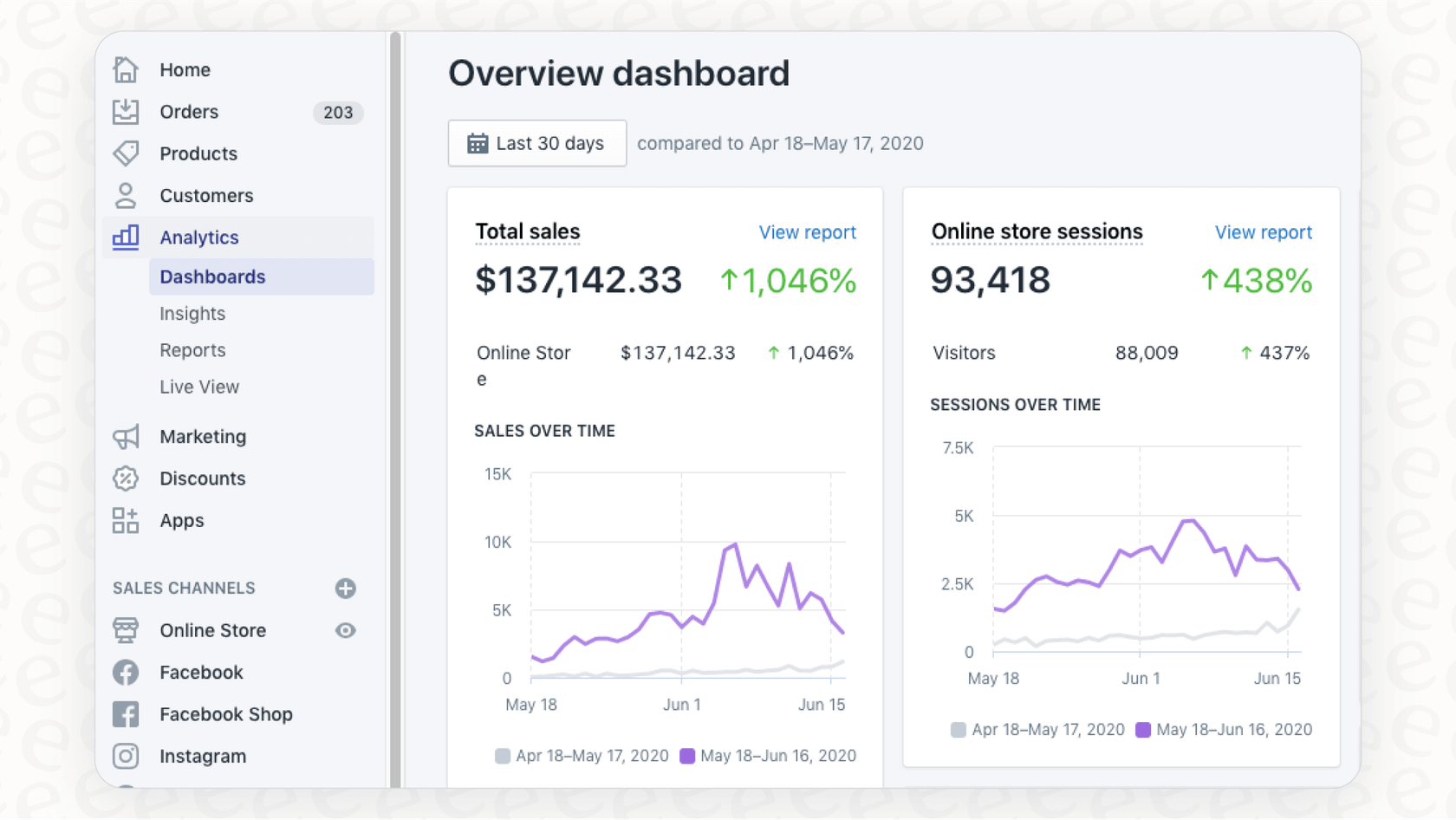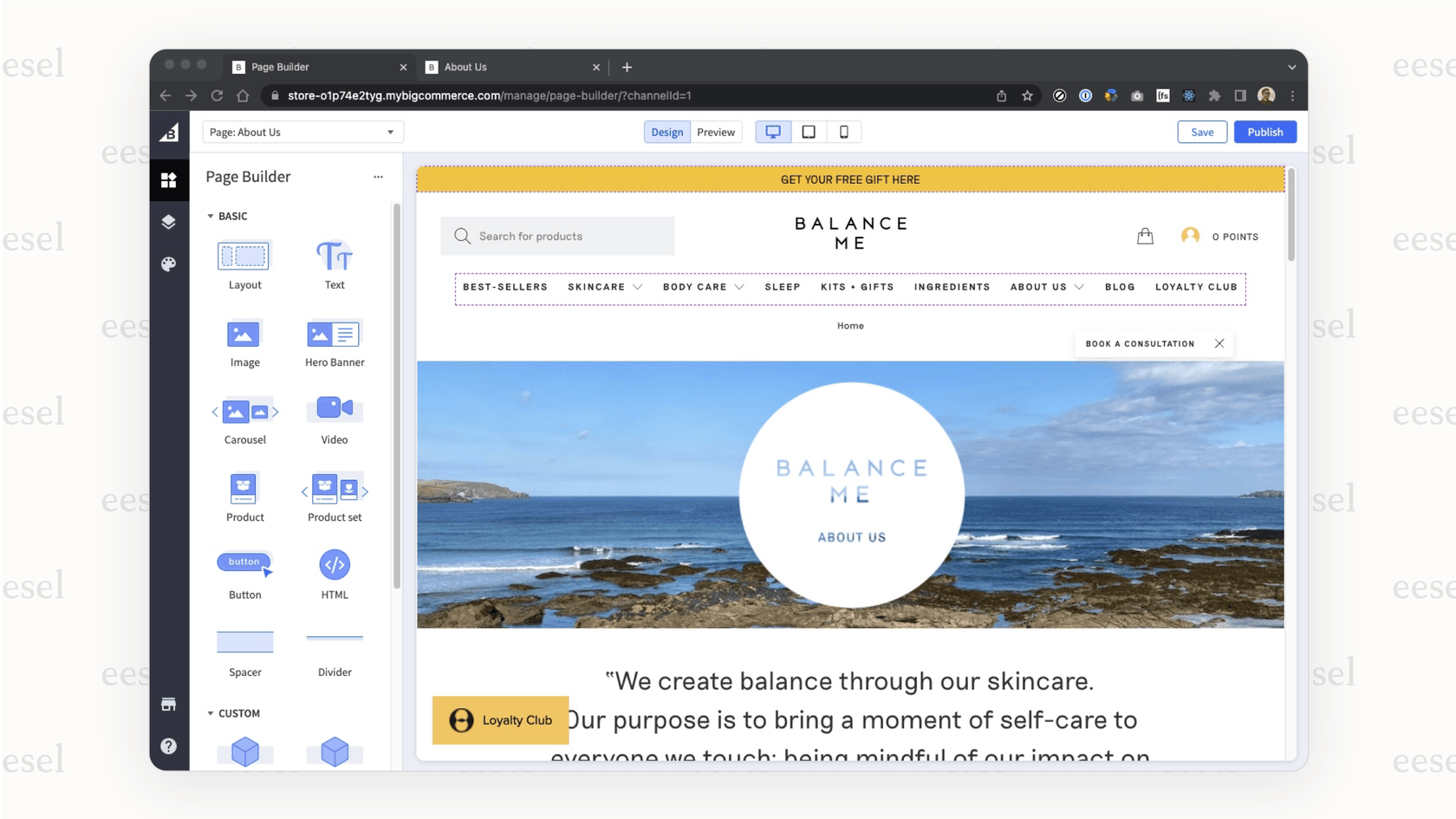Shopify vs BigCommerce: Which is best for your online store?

Kenneth Pangan

Stanley Nicholas
Last edited October 5, 2025
Expert Verified

Picking an ecommerce platform is one of the most important decisions you'll make for your business. It's not just a website builder; it's the engine for your sales, marketing, and the entire customer experience. Two of the biggest names you'll run into are Shopify and BigCommerce. On the surface, they seem similar, but they're built for very different types of businesses.
If you get this choice wrong, you could be looking at slow growth, a ton of operational headaches, or even a painful and expensive move to another platform later on.
This guide will walk you through the real differences in features, scalability, support, AI tools, and pricing to help you settle the Shopify vs BigCommerce debate for your own business.
What is Shopify vs BigCommerce?
Before we get into a side-by-side comparison, let's get a feel for what each platform is really about.
What is Shopify?
Shopify is an all-in-one platform known for being incredibly simple and easy to use. Its whole philosophy is to give you a solid, user-friendly starting point that you can then customize with a massive ecosystem of thousands of apps. This makes it a great fit for almost anyone, from a solo founder launching their first product to huge brands like Gymshark and Mattel. With millions of businesses using it, there's no question it's the market leader.

What is BigCommerce?
BigCommerce is what’s known as an "Open SaaS" platform, which is a fancy way of saying it packs more advanced features into its core product right from the start. The idea is to give you more power out of the box for things like B2B sales, managing multiple storefronts, or handling complex product catalogs, so you don't have to lean so heavily on third-party apps. This makes it a solid option for more established businesses or enterprise-level companies like Skullcandy and Sharp that have more complex needs.
Building and managing your store
This is where you'll be spending most of your time, so how it feels to set up products, design your site, and manage everything day-to-day really matters.
Ease of use: Getting started quickly
Shopify consistently gets top marks for its clean, intuitive dashboard. The setup process is streamlined and very friendly for beginners. Honestly, you can get a decent-looking, functional store up and running in a few hours without needing to know a single line of code.
BigCommerce, on the other hand, has a bit of a steeper learning curve. The interface uses more technical terms and throws more settings at you right away, which can feel a bit much if you're new to all this. It’s really built for merchants who already know they have complex needs from day one.

Themes and design: Creating your brand's look
When it comes to looks, Shopify has a clear edge. It offers a much wider selection of modern, stylish, and mobile-friendly themes (over 800, with about 24 free ones). The theme editor is also generally easier for non-technical folks to use, so you can create a professional-looking site that actually matches your brand without pulling your hair out.
BigCommerce has fewer themes to choose from (around 200, with only 12 free), and a lot of them can feel a bit dated or look very similar to each other. If you want a really unique design, you’ll likely need someone with coding skills to help out.

Product management: Handling your catalog
This is where BigCommerce starts to pull ahead. Shopify is great for most stores, but it has one infamous limitation: you can only have 100 variants per product. If you sell t-shirts in 10 sizes and 12 colors, you’ve already blown past that limit. It’s a common frustration that forces people into using clunky workarounds or paying for extra apps.
BigCommerce is the clear winner here. It lets you have up to 600 variants per product and includes more powerful, built-in features for creating product rules and custom fields without needing to install anything extra. If your inventory is large or complicated, BigCommerce was made for you.
Selling and scaling your business
Once your store is up, you need the tools to actually make sales and grow. Here’s how the two platforms compare.
Core sales features: From POS to multichannel
Both platforms let you sell across different channels like Amazon, eBay, and social media. BigCommerce has a slightly more centralized "Channel Manager" to handle this, while Shopify's approach usually means installing a separate app for each new channel you want to connect.
For selling in person, Shopify has a huge advantage with its native Point of Sale system, Shopify POS. It’s deeply integrated and smoothly syncs your online and physical store inventory, sales, and customer info. BigCommerce uses third-party POS systems, which can work just fine, but they don't always give you that same seamless, all-in-one feeling.
Payments and fees: Understanding the real cost
This is a big one. Shopify really wants you to use its own payment gateway, Shopify Payments. If you do, you get pretty good rates and, more importantly, you pay zero transaction fees to Shopify. But if you decide to use a different gateway like PayPal or Stripe, Shopify will charge you an extra fee (from 0.6% to 2.0%) on top of what your payment processor charges. That can add up.

BigCommerce does things differently. It charges no additional transaction fees, regardless of which payment gateway you use. For businesses that already have a payment provider they like, this can mean saving a lot of money in the long run.
Scalability: Growing without limits
BigCommerce really stands out with its multi-storefront feature, which lets you manage several different brands or regional stores from a single login. This is available on their standard plans and is a huge deal for some businesses. It also has stronger built-in B2B features, like setting up customer groups with special pricing. The catch? BigCommerce puts annual sales limits on its plans, meaning you have to upgrade to a more expensive plan as your revenue grows.

Shopify has no sales limits on any of its plans, so your costs are more predictable as you scale. The trade-off is that if you need those advanced B2B or multi-store features, you have to jump up to their enterprise-level Shopify Plus plan, which starts at a steep $2,300 per month.
Customer support and native AI capabilities
When you're running an online store, good customer support isn't just a nice-to-have; it's essential. Here's how each platform helps you deliver it, and where they both come up short.
Built-in support tools
Both Shopify and BigCommerce offer their merchants 24/7 support, along with basic tools like contact forms and simple help center builders. But when it comes to actually managing conversations with your customers, their built-in tools just don't cut it for a growing business. To offer professional support that can scale, you'll need to connect a proper helpdesk like Zendesk, Gorgias, or Intercom.
The limitations of platform AI
With all the buzz around AI, you'd think these platforms would have some powerful automation tools ready to go, but the reality is a bit underwhelming.
- Shopify: Has something called Shopify Magic, which is a set of AI tools mostly for writing things like product descriptions or emails. Its customer-facing chatbot, Shopify Inbox, is very basic. It can't handle complex questions or learn from anything beyond a simple FAQ page.

- BigCommerce: The built-in AI is even more limited. You get the BigAI Copywriter for product descriptions, and that’s about it. For any real support automation, they point you straight to their app marketplace.

The issue is that both platforms force you to rely on apps for any serious support automation. These apps often operate in their own little bubbles, can be tricky to set up, and don't learn from all your company's knowledge, like past support tickets or internal docs. Plus, many of them have unpredictable pricing based on how many tickets they resolve, which can get expensive quickly.
The modern solution: Integrating a dedicated AI support agent
Instead of juggling limited built-in tools or disconnected apps, many brands are now using specialized AI platforms that plug into the tools they already use.
For example, an AI agent like eesel AI connects directly with your Shopify or BigCommerce store, your helpdesk, and all your other knowledge sources, like old support tickets, internal docs in Confluence, or guides in Google Docs. This creates a single, unified "brain" for all your customer support knowledge.
This approach gives you complete control. You can automate responses to common questions, get [instant draft replies for your human agents](https://eesel.ai/solution/ai-agent-assist), and add a powerful [AI Chatbot](https://www.eesel.ai/product/ai-chatbot) to your site that can answer detailed product and order questions 24/7. The best part is you can get it up and running in minutes without having to switch your helpdesk. ## Comparing Shopify and BigCommerce pricing Here's a quick look at what you can expect to pay for the main plans from both platforms. Pay close attention to the details, because the monthly price tag doesn't tell the whole story. ### [Shopify pricing plans](https://www.shopify.com/pricing) | Plan | Monthly Price (Billed Annually) | Online Card Rates (Shopify Payments) | 3rd-Party Transaction Fee | Key Features | | :--- | :--- | :--- | :--- | :--- | | **Basic** | $29/mo | 2.9% + 30¢ | 2.0% | 2 staff accounts, 10 inventory locations | | **Shopify** | $79/mo | 2.7% + 30¢ | 1.0% | 5 staff accounts, professional reports | | **Advanced** | $299/mo | 2.5% + 30¢ | 0.6% | 15 staff accounts, advanced reports, calculated shipping | | **Plus** | from $2,300/mo | Custom | 0.2% | Unlimited staff, B2B, multi-store | ### [BigCommerce pricing plans](https://www.bigcommerce.com/pricing/) | Plan | Monthly Price (Billed Annually) | Online Sales Limit | Card Rates (PayPal) | Key Features | | :--- | :--- | :--- | :--- | :--- | | **Standard** | $29/mo | Up to $50k/year | 2.89% + 29¢ | Unlimited staff, 0% transaction fee | | **Plus** | $79/mo | Up to $180k/year | 2.35% + 49¢ | Customer groups, abandoned cart saver | | **Pro** | $299/mo | Up to $400k/year | 2.35% + 49¢ | Product filtering, Google reviews | | **Enterprise** | Custom | Custom | Custom | Price lists, unlimited API calls | ## The final verdict: Which platform should you choose? So, after all that, who comes out on top in the Shopify vs BigCommerce battle? The honest answer is: it completely depends on your business. * **Choose Shopify if:** You're just starting out, you run a direct-to-consumer brand, or your top priority is ease of use and having a massive app store to choose from. It's the best option for getting up and running quickly and having the flexibility to add features as you go. * **Choose BigCommerce if:** You have a large, complicated product catalog, need strong B2B features right away, or you want to avoid transaction fees and don't mind the sales limits on plans. It's better suited for established businesses with more technical needs from the get-go. This video offers a detailed comparison to help you decide between Shopify and BigCommerce for your 2025 ecommerce needs.
Final thoughts
Both Shopify and BigCommerce are fantastic platforms, but they're designed for different kinds of users. Your choice should come down to your business model, how comfortable you are with technology, and your plans for growth. Whichever one you pick, just remember that amazing customer support doesn't come in the box; it's something you build by integrating the right tools.
Frequently asked questions
Shopify is generally recognized for its intuitive dashboard and quick setup, making it very beginner-friendly. BigCommerce has a steeper learning curve with more advanced settings visible from the start, often better suited for users with existing e-commerce experience.
Shopify has a significant limitation of 100 variants per product, which can be restrictive for complex catalogs. BigCommerce is much more robust, allowing up to 600 variants per product and offering more powerful built-in features for product rules without needing extra apps.
Shopify charges transaction fees (0.6% to 2.0%) if you don't use Shopify Payments, on top of your payment processor's fees. BigCommerce does not charge any additional transaction fees, regardless of the payment gateway you choose, which can lead to savings for some businesses.
Yes, BigCommerce plans have annual sales limits, requiring you to upgrade to a more expensive plan as your revenue grows. Shopify, on the other hand, has no sales limits on its standard plans, offering more predictable costs as you scale, though advanced features like multi-storefronts are typically reserved for Shopify Plus.
Shopify generally has an edge with a wider selection of modern, mobile-friendly themes and a more user-friendly theme editor. BigCommerce has fewer themes, some of which can appear a bit dated, and often requires coding skills for unique designs.
Shopify is ideal for direct-to-consumer brands, startups, or those prioritizing ease of use and a vast app ecosystem. BigCommerce often suits established businesses or enterprises with complex product catalogs, B2B needs, or a desire for more built-in advanced features and no platform transaction fees.
Share this post

Article by
Kenneth Pangan
Writer and marketer for over ten years, Kenneth Pangan splits his time between history, politics, and art with plenty of interruptions from his dogs demanding attention.





